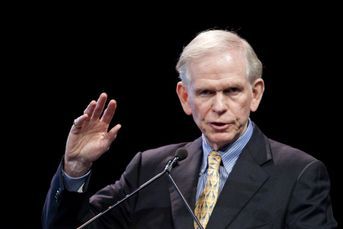Profit drops 70% at Morgan Stanley
Brokerage firm set aside $1.2B in fourth quarter for litigation, misses return on equity goal.
Profit at Morgan Stanley, owner of the world’s largest brokerage, fell 70% as the firm set aside $1.2 billion for litigation related to mortgage-backed securities.
Fourth-quarter net income declined to $181 million, or 7 cents a share, from $594 million, or 29 cents, a year earlier, the company said Friday in a statement. Excluding an accounting charge tied to the firm’s own debt, a tax benefit and the legal expenses, profit was 50 cents a share.
While Morgan Stanley achieved its goals on cost cutting and reducing capital used by the trading business, the firm hasn’t reached chief executive James Gorman’s target of doubling return on equity. Morgan Stanley joined JPMorgan Chase & Co. and The Goldman Sachs Group Inc. in boosting reserves for litigation.
“We are continuing to address many of the legal issues from the financial crisis,” Mr. Gorman said in the statement. “We look forward to further progress on our strategic goals as we move into 2014 with strength and momentum.”
Morgan Stanley shares fell 0.7% to $32 Thursday. The shares have more than doubled since June 2012, and are now 8.1% above the price when Mr. Gorman took over at the end of 2009.
ROE GOAL
Mr. Gorman said in May that his firm can post a 10% return on equity, double that of 2012, by this year if regulators allow it to return a “reasonable” amount of capital to shareholders. ROE, a measure of profitability, was 6% in the first nine months of 2013, and the bank announced a $500 million stock buyback in July.
The wealth-management unit can earn a pretax margin of more than 23% by 2015 as interest rates and stock markets climb and the firm uses client deposits to boost lending, Mr. Gorman said in June. The bank is targeting a 70% loan-to-deposit ratio in 2015, driven by growth in products such as mortgages and corporate lending, up from 55% in 2012.
The increase in asset prices globally in 2013 has helped boost performance at the brokerage, which generates more than a third of revenue from fee-based accounts that often earn a percentage of assets. Rising stock indexes have also benefited Morgan Stanley, which is the only Wall Street firm to generate more revenue from equity trading than fixed-income trading.
‘ACUTE’ BATTLE
Morgan Stanley topped all global investment banks in equity-trading revenue in the third quarter. The firm is now seeing an “acute” battle for equity traders, Colm Kelleher, head of the investment bank and trading division, said last month.
The firm exited some units within its fixed-income and commodities division and decreased capital dedicated to that segment. It had $213 billion of risk-weighted assets tied to the division at the end of September, ahead of its target for the end of 2014.
Morgan Stanley’s head of interest rates trading, Glenn Hadden, left earlier this month after two years with the firm. He said he had different views over how the business should be run than Michael Heaney and Robert Rooney, who took over leadership of the fixed-income division last year. Mitch Nadel and Jakob Horder were named to replace Mr. Hadden.
The Federal Reserve is weighing further restrictions on banks’ trading and warehousing of physical commodities as Congress scrutinizes potential conflicts of interest and manipulation in those markets. The central bank noted that recent accidents and natural disasters have increased concerns about the businesses.
Morgan Stanley agreed last month to sell a unit that stores, trades and transports oil products to a subsidiary of Russia’s OAO Rosneft. The firm also said it’s exploring strategic options for its stake in TransMontaigne Inc., the Denver-based petroleum and chemical transportation and storage company.
Morgan Stanley was the second-ranked adviser on global announced mergers and acquisitions in 2013, according to data compiled by Bloomberg. It was also the No. 3 underwriter of global equity, equity-linked and rights offerings, the data show.
(Bloomberg News)
Learn more about reprints and licensing for this article.








